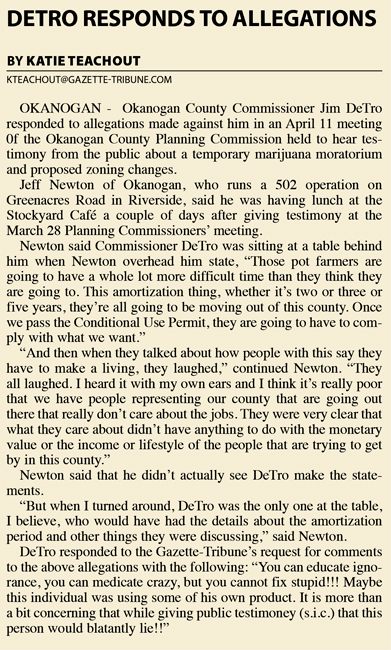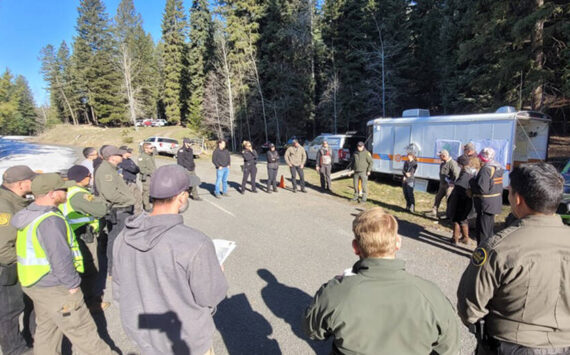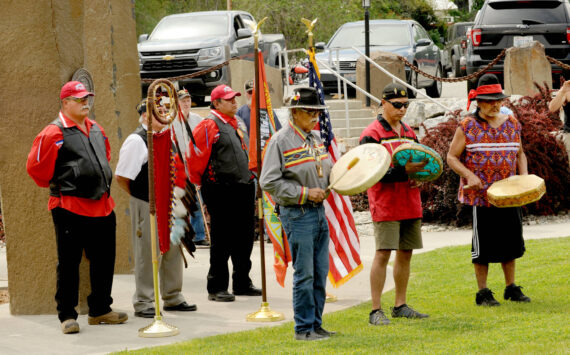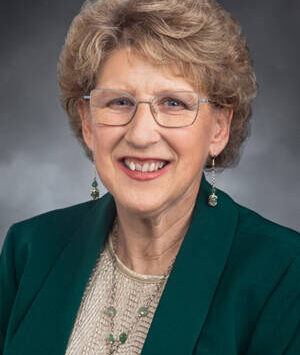OKANOGAN-A group of Okanogan County cannabis farmers presented two different proposals to the Okanogan County Board of Commissioners Tuesday, April 19, to address current concerns with the cannabis industry.
The first proposal suggests establishing an Okanogan County Marijuana Industry-Rules Working Group sponsored by the Okanogan Planning and Building Commission. It would include participants from the cannabis industry (producers, processors and/or retailers), concerned citizens and an advisor from the Washington State Liquor and Cannabis Board (WSLCB)’s enforcement or investigation division.
 The purpose of the group would be to recognize cannabis as a legal and contributing industry in Okanogan County; assist the county in developing regulations for cannabis production and processing; develop and provide guidelines for new and existing cannabis businesses in the county; and facilitate sharing and resolution of government, citizen and industry-related concerns.
The purpose of the group would be to recognize cannabis as a legal and contributing industry in Okanogan County; assist the county in developing regulations for cannabis production and processing; develop and provide guidelines for new and existing cannabis businesses in the county; and facilitate sharing and resolution of government, citizen and industry-related concerns.
The committee would be advisory only, with no legal enforcement power; and would welcome input from or involvement with city representatives; Sheriff and police support; the Washington Sungrowers Industry Association; and the Okanogan County Community Coalition.
Participation on the committee would be strictly voluntary with no paid positions.
The committee would also assist with RCW revisions beneficial to Okanogan County such as tax distribution and WSLCB enforcement.
The other proposal suggested establishing a Cannabis Industry Oversight Committee whose purpose would be to ensure cannabis remains a viable industry in Okanogan County; to establish “Good Neighbor” guidelines within the industry; to address on-going industry-related issues in the county; and to interface with county and municipal government agencies on behalf of the industry.
Activities would include compiling, publishing and maintaining a “Best Practices” informational text; coordinating with governmental agencies as needed to ensure compliance with existing rules; and to act as a clearinghouse for validating and sharing industry issues and complaints, as suggested by the WSLCB.
This committee would also be entirely voluntary with no enforcement power. Funding would come from within the cannabis industry; through voluntary contributions or grants and with advertising sales to contractors and suppliers within the industry.
Paul Neir of Howling Dog Farms in Okanogan County said the group looked at the Marijuana/Cannabis Permit Process in Spokane County and turned to a work group in Chelan County created for cannabis rule making for advise and guidance.
“Chelan County is way ahead of us in this process,” said Neir.
Neir said that with Okanogan County already suffering a decline in retail sales over the past two years due to tourism decline after the wildfires and less retail traffic from Canada due to the dollar’s decline this was “not the time to turn away a viable economic opportunity in this county.”
“Okanogan County is the second-largest producer of cannabis in this state; second only to Spokane County with their large indoor grows. And we are the poorest county in the state. Why would we want to give up all these good jobs?” asked Neir. “We are already looking at more job losses this year with the coming closures of Kinross Gold Mine and Hughes Department Store.”
According to a fact sheet published by the Okanogan County Economic Alliance, Kinross Gold is the third largest employer in the county with 229 employees and Hughes Department Store was listed fifteenth with 40 employees.
According to Washington State 1-502 data (http://www.502data.com) Okanogan County has consistently been the second-largest producer in the state for several months, with Spokane County listed in first place.
According to the Washington State Office of Financial Management (OFM), of the 39 counties in Washington, in 2013 (OFM’s latest firm data) Okanogan County had the second lowest median household income (MHI) at $36,292. OFM forecasts 2014 data to show Okanogan County’s MHI dropped to $36,146, the lowest in the state for 2014. OFM further projects 2015 data to show another drop to $34,808, again the lowest MHI in the state and 18.2 percent lower than the second lowest projected MHI of Pend Oreille County at $41,128 in 2015. (see http:www.ofm.wa.gov/).
Despite the bleak economic outlook the facts indicate for Okanogan County’s immediate future, Cannabis producer and processor Jeff Newton said the commissioners were not interested in hearing about the money the cannabis industry can bring in; nor were they willing to acknowledge the money the industry has already brought into the county.
“The meeting was unproductive from the stand point of trying to achieve anything positive. The commissioners were completely not into the idea of having a working group they would be involved with,” said Newton, who arranged the meeting. “We were trying to talk to them about money coming in to the county from different 502 businesses and the industry in general. (Commissioner) Sheila Kennedy did say all they’ve gotten was a $12,300 check.”
Newton said the state collected about $145 million in excise tax from 2015 revenues, and dispersed $6 million of that out among all the counties in Washington state. Okanogan County’s portion was the $12,300.
“Sheila (Kennedy) wouldn’t even entertain the other benefit, besides the twelve thousand-dollar check, of all the sales tax from the three retail cannabis stores in the county. The county’s portion of the sales tax from the marijuana stores was $17,000 in 2015. But the commissioners didn’t even want to talk about sales tax. They wouldn’t even admit it was true.”
All three county commissioners were contacted by the Gazette-Tribune on April 21 asking for comments on the proposals submitted to them April 19, or if they were willing to consider working with the groups. DeTro and Campbell did not respond before this article went to press April 26.
Commissioner Kennedy responded the same day the request was made.
“I am in the process of reviewing the information that was presented to us on Tuesday (April 19), so I am still in the review process,” said Kennedy.
See Related:
Questions answered about medical marijuana policies
Planners hear pros and cons of local cannabis industry




